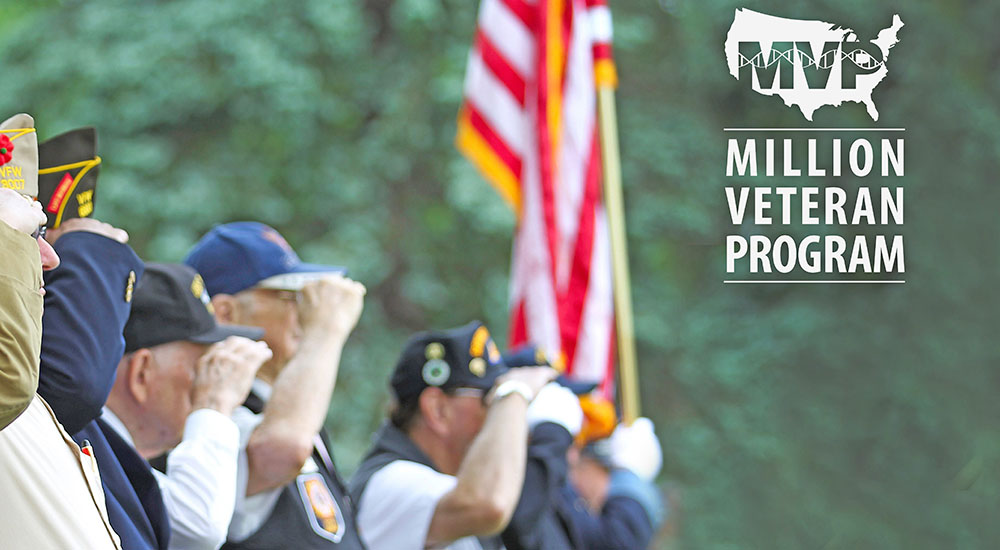VA’s Million Veteran Program (MVP) is a national research program looking at how genes, lifestyle, military experiences and exposures affect Veteran health and wellness. Medical research works best when researchers study large amounts of information from diverse groups of participants. In some instances, researchers narrow their focus to groups of individuals who have all experienced similar things, like Veterans who served at the same time in similar areas.
At MVP, we’re asking Veterans from all service eras to join and help advance health care research for those who served alongside you. The more Veterans who join MVP from a specific period, the more MVP can work to find solutions to health care issues that specifically affect Veterans from that era. Your unique time spent in military service could help researchers make discoveries for Veterans like you.
Here are a couple of ways MVP is already making discoveries for Veterans from different service eras.
PTSD and TBI
Researchers at MVP have been studying Post-Traumatic Stress Disorder (PTSD) and Traumatic Brain Injury (TBI). While PTSD and TBI have been called the signature injuries of Operation Enduring Freedom (OEF) and Operation Iraqi Freedom (OIF), Veterans from all eras have experienced both. The Defense and Veterans Brain Injury Center reported nearly 414,000 TBIs among U.S. service members worldwide between 2000 and late 2019.
MVP researchers are studying ways to better identify and treat both TBI and PTSD.
- Researchers found genes related to re-experiencing traumatic memories, which is a common symptom of PTSD.
- One study confirmed that the likelihood of experiencing PTSD can be inherited. This helped illuminate the biological basis of PTSD which may help uncover new options for therapeutic PTSD treatment.
- Researchers studied the well-being of Veterans screened for deployment-related TBI. They found that some Veterans may still benefit from TBI treatment even if they do not have a formal diagnosis.
- Researchers confirmed that PTSD and TBI are major risk factors for dementia.
Gulf War Illness
Gulf War Illness can appear as a cluster of medically unexplained chronic symptoms that may include fatigue, headaches, joint pain, insomnia, dizziness, respiratory disorders and memory problems. As more Gulf War Veterans join MVP, researchers are better able to study these symptoms in the hope of improving treatment and detection.
One study found that Veterans who deployed had higher odds of displaying GWI symptoms than Veterans who did not deploy. This study lays the groundwork for future research into the biological and environmental factors associated with GWI.
Toxic exposures
The PACT Act is the largest health care and benefits expansion in VA history. It expands and extends eligibility for VA health care for Veterans with toxic exposures and Veterans of the Vietnam, Gulf War and post-9/11 eras.
MVP researchers can use the program to study how a variety of toxic exposures affect Veteran health and the risk for certain illnesses. For instance, post-9/11 and Gulf War Veterans have a higher risk of exposure to burn pits, which may indicate a higher risk for certain cancers. Vietnam Veterans may have been exposed to Agent Orange, which has been linked to illnesses like Parkinson’s and cancer.
MVP researchers:
- Found genes related to head and neck cancers that are different based on ethnicity and may lead to better methods of identifying cancers
- Found that a genetic risk model can accurately predict breast cancer risk in women Veterans resulting in the potential for personalized screenings based on breast cancer risk
- Discovered that a genetic screening test can help predict prostate cancer in male Veterans from many different racial and ethnic backgrounds
- Discovered that a gene associated with Parkinson’s disease is also associated with PTSD
Join over 960,000 Veterans in VA’s Million Veteran Program
The findings in this article were made possible by Veterans from all service eras in VA’s Million Veteran Program. MVP is less than 40,000 Veterans away from reaching its goal of enrolling one million Veterans. By joining, you can help MVP study dozens of health conditions that affect Veterans, including:
- Cancer
- Diabetes
- Heart health
- Tinnitus
Join the Million Veteran Program today or call 866-441-6075 to make an appointment at a participating VA facility. You don’t need to receive your care at VA to participate.
Topics in this story
More Stories
Bob Jesse Award celebrates the achievements of a VA employee and a team or department that exemplifies innovative practices within VA.
The Medical Foster Home program offers Veterans an alternative to nursing homes.
Watch the Under Secretary for Health and a panel of experts discuss VA Health Connect tele-emergency care.







Concerning the PACT
Act. Unfortunately the VA used an outside Company that from what I saw was not near qualified, or qualified , but used sub personal for the meetings with Vets. I had two interactions on this. The first one gave me increases on two areas, and gave me a 0 % on a third. the third was for high blood pressure. For many years I have been taking three different meds daily and one nightly for high blood pressure. I have had BP as high as 185, and a low around 120. If my BP were averaged over the years it would probably be in the 150″s. On the day of my meeting they took it once ad it was I believe 128. Finding 0%.
I went to the DAV who represents me, and was told to not dispute it because the VA may take some of my disability away! Why would the VA do this??
So far I have received no answers, but am highly disappointed with the DAV and the VA.
I have PTSD from Mst and served as a tank mechanic/heavy vehicle repair
I tried to join but got a 503 error
You are not listening burn pits in the United States.
A huge THANK YOU to everybody within the VA system for helping us veterans with our various maladies, Your efforts are appreciated!!!